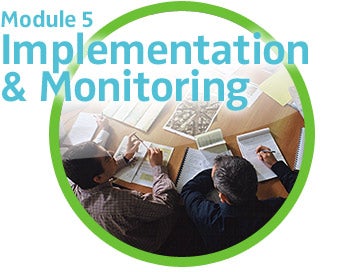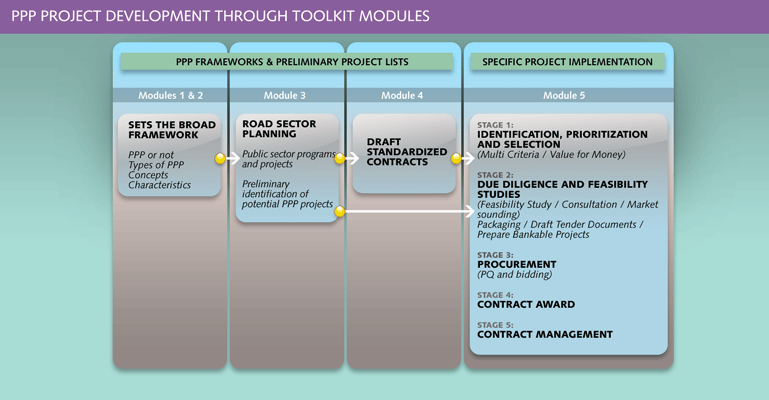

 Stages in PPP development
Stages in PPP development
from project identification to contract management
Module 5: Implementation and Monitoring provides a comprehensive approach to implementing a highway PPP at the project level through a description of the key stages for development of PPP projects from project identification, preparation, tendering and contract monitoring and renegotiation.
At an implementation level, Module 5 can be considered as the central part of the Toolkit by advising and guiding public sector users on the whole process for a given PPP project and by referring when necessary to other Modules, which provide for the required strategy, policy framework and legal and regulatory environment for PPP development.

Module 5 describes the five key stages in the process from selection of projects, through contract award and until the transfer back of the facilities to the public authority. The stages allow for each PPP project to be individually tailored to its particular characteristics and environment, essential for successful implementation.
- Stage 1: Identification, Prioritization and Selection of the PPP Project.
- Stage 2: Due Diligence and Feasibility Studies. This process includes activities and studies to ensure the selected project is well designed and can be successfully tendered and implemented.
- Stage 3: Procurement. This stage includes prequalification of bidders and the bidding and bid evaluation process and includes a section on Unsolicited Bids.
- Stage 4: Contract Award. This stage gives advice on dealing with the preferred bidder(s).
- Stage 5: Contract Management. This deals with the construction and/or operation periods of a project including transfer back if relevant.
| Refer to "The PPP Cycle" for description and reference documents of project stages. |
Additional sections are included on Amendments to Contracts, including Renegotiation, and Dispute Resolution, Use of Advisors and Dialogue Process.
In particular, the importance of the role of the Transaction Advisor is highlighted in order to obtain sound advice, geared to the users' particular needs and requirements, essential when developing and implementing PPP project contracts with long durations. Advisors can help avoid costly political and financial mistakes related to PPP projects.
Finally before looking at project implementation, we should remind ourselves what is transport development about. Overall, the goal is safe, clean, and affordable transport that contributes to economic development. Agencies, and especially the World Bank, are thus moving from a strategy based on transport modes to a business approach driven by results, inside and outside the transport sector. As with other infrastructure sectors, transport is aimed at unlocking growth and development potential, and project implementation should keep this in mind.